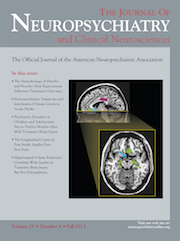To the Editor: Delusional infestation is a type of thought disorder characterized by conviction of being infested by pathogens without any medical or microbiological evidence for this.
1 It has also being described as delusional parasitosis, entomophobia, parasitophobia,
Dermatozoenwahn, and Ekbom’s syndrome.
1–3 This condition has occasionally been found to be associated with systemic conditions like pellagra, vitamin B
12 deficiency, cerebrovascular disease, temporal lobe epilepsy, and leprosy.
3,4 We describe here for the first time a patient with delusional infestation of the scalp, who responded to blonanserin, a new atypical antipsychotic.
A 45-year-old married man was referred by the dermatology clinic with a 9-month history of itching on the scalp, attributing it to infestation by insects. He had himself used many antiseptics for removing insects, but felt no relief. The patient also brought scalp hair for examination, which revealed no parasites. There had been a no change in the symptom since its onset. Because of this infestation, he had developed anxiety, headache, itching of the scalp, and sleeplessness. Detailed neurological examination and relevant investigations did not reveal any abnormality. There was no past history of any chronic psychiatric or physical disorder or drug abuse. Mental state examination revealed a middle-aged man of pyknic build. Psychomotor activity, speech, and perception were normal. He had delusions of being infested by small insects on the scalp. Higher mental functions were normal.
The patient was started on blonanserin 4 mg/day, which was gradually increased to 8 mg/day in 3 weeks’ time. There was complete remission, and, on 3-month follow-up, he did not develop the symptoms again.
The exact mechanism of the evolution of the delusional system in this disorder is not known. One hypothesis is that these patients suffer a profound breakdown in their ability to discriminate between normal and abnormal somatic perceptions, and the delusion may be mediated by endogenous dysfunction in the limbic system. This dysfunction may be the result of a pathological overactivity of the dopaminergic system, as evidenced by the efficacy of the specific dopamine antagonist, pimozide.
2,4 There are reports mentioning the usefulness of second-generation antipsychotics in the treatment of delusional parasitosis.
5 Blonanserin is a new, mixed dopamine D
2 and serotonin 5-HT
2 receptor antagonist with a favorable side-effect profile. It is used for the treatment of schizophrenia

